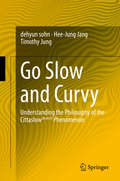- Table View
- List View
Go Live!: Turn Virtual Connections into Paying Customers
by Jeffrey GitomerLearn how to go online with a winning sales and marketing strategy in this insightful resource Go Live! Turn Virtual Connections into Paying Customers helps readers understand and take advantage of several online tools to boost their sales and increase their revenue. Accomplished salesperson, consultant, and online personality Jeffrey Gitomer describes how tools like Facebook Live and podcasting can drive sales and help you connect with your customers. You'll discover: How to use tools like YouTube, LinkedIn Live, podcasting, and Facebook Live to connect with and develop your leads How to properly utilize social media like Instagram and Twitter to spread your message and sell to clients How to promote and repurpose content to create as big an impact on your audience as possible Written specifically for a post-pandemic sales audience, Go Live! Turn Virtual Connections into Paying Customers delivers results for anyone expected to deliver sales results in a virtual environment. It also belongs on the bookshelves of those who hope to take their successful offline sales strategies to the online world.
Go Long: Why Long-Term Thinking Is Your Best Short-Term Strategy
by Brian Dumaine Michael Useem David M. Rubenstein Dennis Carey Rodney ZemmelThe lifespans of companies are growing shorter each day. Why do some companies thrive and grow, while others fail? Inspired by the CEO Academy, the annual off-the-record gathering of chief executive officers organized by the authors, Go Long reveals how some of the world’s most prominent business leaders resisted short-term pressures to successfully manage their organizations for the long term, and in turn, aim to create more jobs, more satisfied customers, and more shareholder wealth.In Go Long, authors Dennis Carey, Brian Dumaine, Michael Useem, and Rodney Zemmel take you behind-the-scenes to witness the business decisions that are enabling leading organizations to outsmart and outlast the competition. Why did CEO Larry Merlo allow CVS to take a $2 billion hit—on purpose? How did CEO Alan Mulally maneuver Ford’s $48 billion turnaround? How did director Maggie Wilderotter and her fellow board members engage top management to embark on an unusual exercise to help Hewlett Packard Enterprise build a long-term strategy? Why did CEO Paul Polman’s turn back to Unilever’s original mission of leading with a purpose to fuel profits? How did CEO Ivan Seidenberg convince his investors and board to allow him to make a $150 billion bet? How did CEO George Buckley find a way to address investor calls for 3M to spend less on research and development while still finding a way to innovate?These leaders argue that a short-term mindset might satisfy investors for this quarter or next, but there’s a heavy price to be paid. Instead, they argue, long-term thinking is your best short-term strategy.Called a “mandatory read” by David M. Rubenstein, co-founder and co-executive chairman of The Carlyle Group, Go Long is a critical resource for leaders who want their organizations to survive over the long-term and for anyone who cares about the global economy.
Go Mobile
by Jamie Turner Jeanne HopkinsSet-up, run, and measure successful mobile media marketing campaignsGo Mobile is packed with tools, tips, and techniques that will help readers set-up, launch, run, and measure mobile media campaigns. This book will help readers understand the different mobile media platforms, learn how to us SMS for business, incorporate 2D and QR Codes into their campaigns, develop mobile websites and mobile apps, see case studies, and much more.Go Mobile offers practical, step-by-step guidance for implementing a mobile marketing campaign. Readers will learn how to:Use location-based marketing to get new customers and keep existing onesIntegrate social media with your mobile media campaignUse mobile E-commerce to improve brand loyaltyMeasure the ROI of a mobile media campaignDevelop mobile media business models you can use to grow revenuesWith these effective, efficient, and integrated mobile marketing campaigns, business owners and marketers will garner enviable response rates and watch their revenue grow more rapidly than ever before.
Go Mobile: Aligning District Managers and Store Teams
by Tatiana SandinoThis case study explores organizational design and incentive choices related to building a middle management layer as a company scales up its operations. Go Mobile, an Indian mobile phone retailer, uses high-powered incentives to encourage an entrepreneurial spirit among store employees. The company is faced with the challenge of motivating its district managers to support the highly incentivized store teams. On one hand, the district managers are expected to drive a profitable expansion, supporting complex day-to-day operations at the stores. On the other hand, they are expected to instill a culture of exceptional service and integrity among Go Mobile's employees. The case presents different systems that the company could use to motivate the district managers to fulfill these, sometimes conflicting, roles.
Go Mobile: Aligning District Managers and Store Teams
by Tatiana SandinoThis case study explores organizational design and incentive choices related to building a middle management layer as a company scales up its operations. Go Mobile, an Indian mobile phone retailer, uses high-powered incentives to encourage an entrepreneurial spirit among store employees. The company is faced with the challenge of motivating its district managers to support the highly incentivized store teams. On one hand, the district managers are expected to drive a profitable expansion, supporting complex day-to-day operations at the stores. On the other hand, they are expected to instill a culture of exceptional service and integrity among Go Mobile's employees. The case presents different systems that the company could use to motivate the district managers to fulfill these, sometimes conflicting, roles. This product can be used with the free Job Design Optimization Tool (JDOT), available at: hbsp.harvard.edu/jdot
Go Pro: 7 Steps to Becoming a Network Marketing Professional
by Eric WorreOver twenty years ago at a company convention, Eric Worre had an "aha" moment that changed his life forever. At that event he made the decision to Go Pro and become a Network Marketing expert. Since that time, he has focused on developing the skills to do just that. In doing so, Eric has touched and been touched by hundreds of thousands of people around the world. Now he shares his wisdom in a guide that will ignite your passion for this profession and help you make the decision to Go Pro and create the life of your dreams.
Go Put Your Strengths to Work: 6 Powerful Steps to Achieve Outstanding Performance
by Marcus BuckinghamBeginning with the million-copy bestsellers First, Break All the Rules and Now, Discover Your Strengths, Marcus Buckingham jump-started the strengths movement that is now sweeping the work world, from business to government to education. Now that the movement is in full swing, Buckingham's new book answers the ultimate question: How can you actually apply your strengths for maximum success at work? Research data show that most people do not come close to making full use of their assets at work -- in fact, only 17 percent of the workforce believe they use all of their strengths on the job. Go Put Your Strengths to Work aims to change that through a six-step, six-week experience that will reveal the hidden dimensions of your strengths. Buckingham shows you how to seize control of your assets and rewrite your job description under the nose of your boss. You will learn: Why your strengths aren't "what you are good at" and your weaknesses aren't "what you are bad at." How to use the four telltale signs to identify your strengths. The simple steps you can take each week to push your time at work toward those activities that strengthen you and away from those that don't. How to talk to your boss and your colleagues about your strengths without sounding like you're bragging and about your weaknesses without sounding like you're whining. The fifteen-minute weekly ritual that will keep you on your strengths path your entire career. With structured exercises that will become part of your regular workweek and proven tactics from people who have successfully applied the book's lessons, Go Put Your Strengths to Work will arm you with a radically different approach to your work life. As part of the book's program you'll take an online Strengths Engagement Track, a focused and powerful gauge that has proven to be the best way to measure the level of engagement of your strengths or your team's strengths. You can also download the first two segments of the renowned companion film series Trombone Player Wanted. Go Put Your Strengths to Work will open up exciting uncharted territory for you and your organization. Join the strengths movement and thrive.
Go Put Your Strengths to Work: 6 Powerful Steps to Achieve Outstanding Performance
by Marcus BuckinghamMarcus Buckingham&’s books have guided millions to become top performers in everything they do by focusing on their strengths. In Go Put Your Strengths to Work, a Wall Street Journal bestseller, Buckingham will show you how to hone and apply your strengths for maximum success in your career.Research data show that most people do not come close to making full use of their assets at work—in fact, only seventeen percent of the workforce believe they use all of their strengths on the job. Go Put Your Strengths to Work aims to change that through a six-step, six-week experience that will reveal the hidden dimensions of your strengths. Buckingham shows you how to seize control of your assets and rewrite your job description under the nose of your boss. You will learn: -Why your strengths aren't “what you are good at” and your weaknesses aren’t “what you are bad at.” -How to use the four telltale signs to identify your strengths. -The simple steps you can take each week to push your time at work toward those activities that strengthen you and away from those that don’t. -How to talk to your boss and your colleagues about your strengths without sounding like you’re bragging and about your weaknesses without sounding like you’re whining. -The fifteen-minute weekly ritual that will keep you on your strengths path your entire career. With structured exercises that will become part of your regular workweek and proven tactics from people who have successfully applied the book's lessons, Go Put Your Strengths to Work will arm you with a radically different approach to your work life. As part of the book's program you'll take an online Strengths Engagement Track, a focused and powerful gauge that has proven to be the best way to measure the level of engagement of your strengths or your team's strengths. You can also download the first two segments of the renowned companion film series Trombone Player Wanted. Go Put Your Strengths to Work will open up exciting uncharted territory for you and your organization. Join the strengths movement and thrive.
Go Red For Women: Raising Heart Health Awareness
by V. Kasturi RanganIn 2003, the $654 million American Heart Association (AHA) approached Cone, Inc. (a brand and communications agency) to develop a corporate sponsorship strategy that would raise $75 million over three years. Within 12 months, the AHA launched the highly successful Go Red For Women campaign to help women understand their risk for heart disease. But Go Red became more than a fundraising vehicle. It energized the AHA and its 22 million volunteers, and potentially sparked a long-term movement focused on women and their prevention of heart disease. Traces the development of the relationship between Cone and the AHA and the development of the Go Red For Women campaign. Challenges students to assess the success of Go Red and its impact on the AHA and its goals. Concludes by summarizing three of the AHA's other health initiatives and questions the appropriate role for the AHA and cause marketing.
Go Red For Women: Raising Heart Health Awareness
by V. Kasturi RanganIn 2003, the $654 million American Heart Association (AHA) approached Cone, Inc. (a brand and communications agency) to develop a corporate sponsorship strategy that would raise $75 million over three years. Within 12 months, the AHA launched the highly successful Go Red For Women campaign to help women understand their risk for heart disease. But Go Red became more than a fundraising vehicle. It energized the AHA and its 22 million volunteers, and potentially sparked a long-term movement focused on women and their prevention of heart disease. Traces the development of the relationship between Cone and the AHA and the development of the Go Red For Women campaign. Challenges students to assess the success of Go Red and its impact on the AHA and its goals. Concludes by summarizing three of the AHA's other health initiatives and questions the appropriate role for the AHA and cause marketing.
Go Slow and Curvy
by Dehyun Sohn Hee-Jung Jang Timothy JungThis book introduces readers to the concepts of sustainability and philosophy of slowness for the management of public entities such as cities or regions. While many urban communities face economic challenges that clearly show the limitations of growth and ever-increasing speed, this book explores an alternative, thought-provoking standpoint in five chapters. The first chapter explains the importance and essence of slowness, smallness and sustainability for public organizations, while the second addresses the concept of "slow life" in an emotional society. Chapter three examines the issue of "slow management" and presents arguments for the value of small businesses as the true foundation of the economy. Chapter four rounds out the coverage with a focus on agriculture. Finally, in chapter five, the authors discuss the overall benefits of a "slow and curvy" management style in order to provide happiness, economic and social sustainability.
Go Team!: Take Your Team to the Next Level: 3 Steps to Great Results
by Ken Blanchard Alan Randolph Peter GrazierAll of us in the today's workforce are called upon more and more to work effectively in teams. But do you know how to build a team that truly takes advantage of the knowledge, experience, and motivation of its members? Most of us don't, and we quickly become frustrated, give up, and opt to go it alone-not a good solution in today's business environment. Fortunately, there is a better way. Here, expert authors Ken Blanchard, Alan Randolph, and Peter Grazier outline a 3-step process that will help you transform any kind of team into a Next-Level Team-one that uses all team members' ideas and motivation more effectively, makes better use of team members' and team leaders' time, and generates benefits for individual team members, the team, and the organization. Designed as a working guide filled with detailed instructions for people who want to build high performing teams, Go Team! will lead you, step by step, to great results. Through discussions, case examples, and questions to consider, you and your teammates will learn how to share information to build high levels of trust and responsibility; set clear boundaries to create the freedom for team members to act responsibly; and develop self-managing skills to make good team decisions. With Go Team! as a guide, you'll find that working in a team can be fun, satisfying, and highly productive.
Go To Market Strategy: Advanced Techniques And Tools For Selling More Products, To More Customers, More Profitably
by Lawrence FriedmanIn this path-breaking new book, best-selling author and leading go-to-market strategist Larry Friedman provides a practical and battle-tested approach for taking products, services, divisions, or even an entire company to market! Drawing on dozens of examples and best-practices across a variety of industries, 'Go To Market Strategy' lays out a clear and actionable blueprint for building a winning go-to-market plan - one that will enable you to do more business, with more customers, more often, and more profitably. In this book you'll find all of the techniques and tools you need to answer today's crucial go-to-market questions:· Which markets offer the best opportunities for profitable growth?· What do my target customers need? How can I do a lot more business with them?· What mix of channels and partners will help me reach and sell to the most customers at the lowest possible cost? · Do I have the right product or solution? How can I create broader customer interest in my offerings?· Do I have a winning value proposition? What would make the 'message' more compelling - and drive more purchasing activity? 'Go To Market Strategy' is not about incremental change. As Friedman points out, it is for executives seeking nothing less than double-digit revenue growth and the slashing of at least 10-15 percent of selling costs - absolutely realistic results that go-to-market innovators have consistently achieved. This book lays out all of the techniques used by the world's top go-to-market leaders, so you too can achieve those kinds of results, and gain a real go-to-market competitive advantage in your markets.
Go Where There Is No Path: Stories of Hustle, Grit, Scholarship, and Faith
by Mim Eichler Rivas Christopher GrayFor all who dare to go off the beaten track, this is the inspirational, power-packed playbook for transforming your life and your world—from a young, Black social entrepreneur whose dorm-room tech startup has helped millions pay for college and access unprecedented opportunity. Gray, the son of a single working mother who had him at age fourteen, grew up in deep poverty in Birmingham, Alabama. An academic star, he had every qualification for attending a top college—except for the financial means. Desperate, Gray headed off the beaten path, searching online to apply for every scholarship he could find. His hustle resulted in awards of 1.3 million dollars and became his call to action to help other students win their own “schollys.” It inspired him to start up Scholly, an app that matches college applicants with millions of dollars in outside scholarships that often go unclaimed. When he was a senior at Drexel University, he appeared on Shark Tank as CEO of Scholly. In the most heated fight in the show’s history, the sharks challenged Gray as to whether his app was a charity or a profitable business. Both, he insisted, proposing a new paradigm for social entrepreneurship and netting deals from Lori Grenier and Daymond John. At the time Scholly’s subscriber base was 90,000 users. Today the app has 4 million subscribers who have won scholarships totaling more than $100 million. Meanwhile, Gray—without help from the mostly all-white boy’s club of Silicon Valley—has emerged as a tech startup superhero now tackling the crisis of student debt with innovative, unrivaled strategies. Gray’s premise is that when you lead with the good—confronting issues such as poverty and racism—the money will follow. His story is proof that when you develop a mindset for success, you turn disadvantages into gold. And when you create opportunities for others, you enrich the marketplace for yourself too. Gray shows us, we can carve out new paths to better days and leave trails for others.
Go Woke, Go Broke: The Inside Story of the Radicalization of Corporate America
by Charles GasparinoA New York Times bestselling author and veteran Fox Business financial journalist&’s explosive deep-dive into the progressive madness that has infected and corrupted the world&’s biggest corporations, threatening the stability of the global economy—and life as we know it. How did a bunch of rich dudes who run corporate America become the tools of left-wing radicals? Intimidated by activists on the left, virtually every major corporation in America has embraced woke politics. For years, these businesses could get away with progressive virtual signaling without worrying about alienating customers. Then the anti-woke counter-offensive movement arrived. As high-profile, disastrous backlashes at companies like Anheuser-Busch, Disney, Target and other companies reveal, companies who cave to the demands of left-wing social justice activists are being punished like never before. Customers are fighting back and taking their money elsewhere. In Go Woke, Go Broke, New York Times bestselling author and veteran financial journalist Charles Gasparino calls out the nonsense and takes readers inside the radicalization of corporate America, based on numerous insider interviews and exclusive reporting. The story is wilder than you can imagine. Gasparino introduces readers to America&’s most woke corporate leaders, tracing the origins of ESG and "stakeholder investing.&” He takes readers along on for a rollicking ride through corporate America as he shines a light, unlike anyone else, on Fortune 500 companies that have suffered for caving to the silly and irresponsible demands of social justice activists and left-wing interests. A respected financial reporter who has covered finance for more than 30 years, Gasparino is deeply sourced and has dug into countless episodes involving Wall Street greed, corporate hubris, and government overreach in enterprise. This explosive, untold story and in-depth examination of the seminal players, institutions, and forces of the markets shows that, for the sake of global stability, we must immediately pry the clenched fists of radical activists off the levers of the economy.
Go for Bold: How to Create Powerful Strategy in Uncertain Times
by Rosie YeoA new approach to designing simple and powerful strategy by harnessing organizational talent and creativity.Strategy is important, but it's not easy to come up with fresh ideas needed for success, let alone bring them to life. Uncertainty about the future, the pressure of competition, risk aversion, and those boring planning meetings employees sit through sap confidence and enthusiasm and produce timid templates for maintaining status quo.This book offers a new approach to designing strategy. It shows how to inspire others to think differently long-term, work through challenging issues constructively, and ultimately become committed to an ambitious, shared future for your organization. Leading strategist Rosie Yeo reveals how to find answers to big questions by unleashing team creativity to hone in on what is most important and map a bold pathway to success. For leaders, aspiring leaders and anyone who needs a future plan, Go For Bold offers a fresh take on the creative collaboration needed to design, implement and achieve your organization's growth and other success metrics.
Go for Gold: Inspiration to Increase Your Leadership Impact
by John MaxwellIf you've read any of John C. Maxwell's books on leadership, you know that leadership is developed daily, not in a day. That's why he's created Go for Gold, a daily companion to Leadership Gold. It's designed to help supercharge your growth as a leader. Go for Gold offers daily bite-sized leadership lessons taken from Dr. Maxwell's catalog of leadership and personal development books. Organized into twenty-six weekly lessons with space for notes from your own leadership journey, Go for Gold will help you jump-start your leadership growth with wisdom and best practices from John C. Maxwell.
Go for the Gold: How Chinese Entrepreneurs Seize Opportunities-and Market Leadership
by Donald N. SullUnpredictable environments periodically provide golden opportunities that allow firms to create significant value in a short period. This chapter introduces a framework to help managers and entrepreneurs systematically evaluate opportunities.
Go-Givers Sell More
by Bob Burg John David MannWith their national bestseller The Go-Giver, Bob Burg and John David Mann took the business world by storm, showing that giving is the most fulfilling and effective path to success. That simple, profound story has inspired hundreds of thousands of readers around the world-but some have wondered how its lessons stand up to the tough challenges of everyday real-world business. Now Burg and Mann answer that question in Go-Givers Sell More, a practical guide that makes giving the cornerstone of a powerful and effective approach to selling. Most of us think of sales as convincing potential customers to do something they don't really want to. This mentality sets up an adversarial relationship and makes the sales process much harder than it has to be. As Burg and Mann demonstrate, it's far more productive (and satisfying) when salespeople think like Go-Givers. Cultivate a trusting relationship and focus exclusively on creating value for the other person, say the authors, and great results will follow automatically. Drawing on a wide range of examples of real-life salespeople who have prospered by giving more, Burg and Mann offer tips and strategies that anyone in sales can start applying right away.
Go-To-Market Uncovered: How to Successfully Launch a Product and Drive Sustainable, Long-Term Revenue Growth
by Paul SullivanA proven blueprint for long-term operating success for entrepreneurs, marketers, sales leaders, and customer success teams In Go-To-Market Uncovered: How to Successfully Launch a Product and Drive Sustainable, Long-Term Revenue Growth, celebrated entrepreneur and go-to-market strategist Paul Sullivan delivers a hands-on discussion of the ARISE framework for bringing B2B SaaS, fintech, and tech-enabled businesses to market. The author shows you how to fully implement this framework in just 30 days. It offers a proven blueprint for long-term success you can apply to your own organization immediately, whether you work in a startup, a scale-up, or a large enterprise. Practical, scalable, and filled with foresight, every stage of the ARISE framework is designed to be thorough and agile, empowering your company to increase its ROI on tech investments and strategic initiatives. You'll also find: Explorations of critical key performance indicators outlining what exactly you need to keep track of and what can be safely disregarded Strategies for aligning your sales and marketing goals to create a unified customer journey Enlightening case studies that illustrate the most common challenges faced by companies and how to overcome them Packed with strategies, templates, worksheets, links to additional resources and reading materials, and valuable lessons, Go-To-Market Uncovered demonstrates how to anticipate potential market forces, position your firm relative to the competition, and overcome performance challenges with startling effectiveness.
GoFundMe: The Giving Layer of the Internet
by Allison M. Ciechanover Scott Duke KominersBy 2017, GoFundMe is the world's largest social fundraising platform. Gross donation volume is growing rapidly yet the number of monthly campaign starts is relatively flat. The CEO contemplates a variety of growth initiatives.
GoPro: Becoming a Subscription Hero
by Elie Ofek Marco Bertini Nicole Tempest KellerIn 2021, Nick Woodman, founder and CEO of GoPro, was reviewing the company's subscription offering, considering whether to extend it beyond benefits that were directly related to the company's iconic camera. Founded in 2002, GoPro had gained renown for its innovative action camera. The brand became synonymous with living an active lifestyle and attracted a strong following on social media. GoPro was a Wall Street favorite when it went public in 2014 at $24 per share, rising to over $90 per share later that year. But just four years later the stock price had slid to $6 per share due to stagnating demand, inventory management issues, bloated expenses, and problems with new product launches. During the COVID-related retail slowdown in 2020, GoPro increased its direct-to-consumer footprint and aggressively marketed a new subscription. The stock price rebounded, in part due to investors placing a higher multiple on the predictable, recurring revenue generated by subscriptions. By 2021, however, subscription benefits were still largely tied to camera ownership. Woodman was considering whether GoPro could leverage its position as an active lifestyle brand to extend the subscription to benefits beyond the camera, similar to the way Amazon packed a host of benefits into Amazon Prime. Woodman saw enormous potential for GoPro's subscription and believed that, someday, it could even become the company's new flagship "product." But how much license did the brand have to grow beyond digital cameras and image capture? What pricing options could the company explore for a bigger, better subscription? In concert with these decisions, should GoPro look to shift even more of its business away from retailers to direct sales?
Goal Directed Project Management: Effective Techniques and Strategies
by Erling S. Andersen Kristoffer V. Grude Tor HaugGoal Directed Project Management (GDPM) is a method developed by the authors, based on practical experience. It has been refined over 40 years and is still widespread in curricula in universities/colleges and adopted as a standard approach by organisations all over the world.The book is different from other textbooks in project management as it is a focused approach on how to do it, rather than a general discussion. The book emphasises PSO (People, System, and Organisational development), the need to develop People (training and motivation) and Organisation in conjunction with Systems/technical development if you want desired results. The book presents detailed and practical guidance on how to plan, organise, and control PSO projects through hierarchical planning with practical methods and tools (milestone and activity planning and responsibility charts). Uncertainty and multi‑project management are also covered.New in this edition is benefit realisation. Most of the work on benefit realisation takes place after a project has been delivered, but a lot can be implemented within the framework of the project. Research shows that the greatest degree of project success is achieved when there is a close relationship between benefit realisation and project management, and between project owner and project manager.
Goal Setting: How to Create an Action Plan and Achieve Your Goals (The\worksmart Ser. #0)
by Michael Dobson Susan B. WILSONWhy is it that some people consistently seem to get more done than others? The answer is that they know how to set specific, achievable goals for themselves...and then follow through on them.This revised and updated edition of Goal Setting features worksheets, quizzes, and other practical tools, giving you powerful techniques you can use to set a goal, make a plan, and acquire the resources and power necessary to achieve your objective.The book shows you how to:act upon their objectives in a precise, targeted wayrecognize obstacles and overcome thembecome more assertivechange counterproductive behaviorestablish prioritiesmake the most of their timeAchieving goals takes hard work and discipline. This expanded edition of Goal Setting gives you the tools and techniques to accomplish anything.
Goal-Free Living
by Stephen M. ShapiroPraise for Goal Free Living Setting goals may be fine. But letting your goals take control of your life can be devastating. Goal-Free Living shows you how to explore paths in your life you never knew existed and discover a more exciting, successful, and rewarding life--today! "If you have only one goal this year, let it be this: Read Goal-Free Living!" --Daniel H. Pink author, A Whole New Mind and Free Agent Nation "Stephen Shapiro's approach will help readers achieve the best kind of happenstance: taking a stance to make things happen. " --Heath Row Contributing Editor and Community Director, Fast Company magazine "I have a sense that reading this book may turn out to be one of the most important things I've done in a long time. " --Doug Busch Vice President and Chief Technology Officer, Digital Health Group, Intel Corporation "This is an engaging, creative approach to discovering inner wisdom and personal fulfillment. " --Michael J. Gelb author, How to Think Like Leonardo da Vinci and Discover Your Genius "Reading Goal-Free Living is like jettisoning a hundred-pound pack. Suddenly, you're racing much faster and enjoying the breeze. " --Alan Weiss, PhD author, Million Dollar Consulting


















